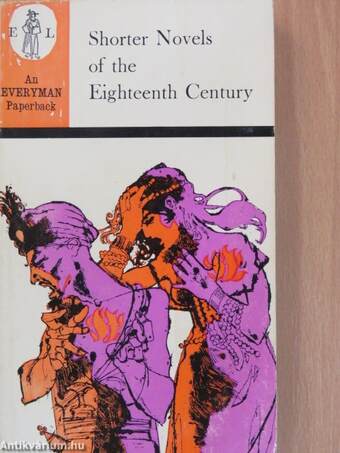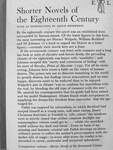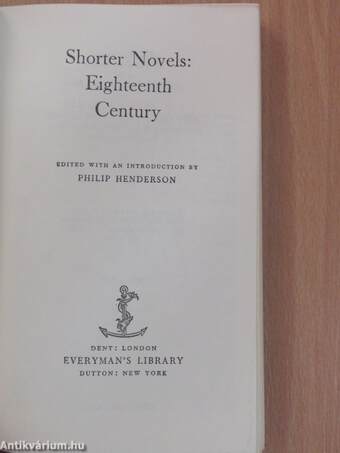1.067.358
kiadvánnyal nyújtjuk Magyarország legnagyobb antikvár könyv-kínálatát

VISSZA
A TETEJÉRE
JAVASLATOKÉszre-
vételek
Shorter Novels: Eighteenth Century
| Kiadó: | J. M. Dent & Sons Ltd. |
|---|---|
| Kiadás helye: | London |
| Kiadás éve: | |
| Kötés típusa: | Ragasztott papírkötés |
| Oldalszám: | 286 oldal |
| Sorozatcím: | An Everyman Paperback |
| Kötetszám: | 1856 |
| Nyelv: | Angol |
| Méret: | 18 cm x 11 cm |
| ISBN: | 0-460-01856-6 |
naponta értesítjük a beérkező friss
kiadványokról
naponta értesítjük a beérkező friss
kiadványokról
Fülszöveg
Shorter Novels of
the Eighteenth Century
WITH AN INTRODUCTION BY PHILIP HENDERSON
By the eighteenth century the novel was an established form
surrounded by famous names. Of the lesser figures in this form
the most interesting are Horace Walpole, William Beckford
and Dr Johnson (it's hard to regard the Doctor as a lesser
figure)—certainly their novels here are a feast.
If the seventeenth century was beset with romance and a long
last look at tales of chivalry and heroic deeds, the prevailing
climate of the eighteenth was heavy with 'sensibility', and
Johnson escaped this 'nicety and correctness of feeling' with
his story of Rasselas, Prince of Abyssinia (1759). For all its exotic
setting, Johnson here wrote a fable on the vanity of human
desires. The prince sets out to discover something in the world
he greatly desires, but finding virtue non-existent and no man
happy, discovers more to be endured than to be enjoyed.
Walpole's aim in Otranto 'was to combine the... Tovább
Fülszöveg
Shorter Novels of
the Eighteenth Century
WITH AN INTRODUCTION BY PHILIP HENDERSON
By the eighteenth century the novel was an established form
surrounded by famous names. Of the lesser figures in this form
the most interesting are Horace Walpole, William Beckford
and Dr Johnson (it's hard to regard the Doctor as a lesser
figure)—certainly their novels here are a feast.
If the seventeenth century was beset with romance and a long
last look at tales of chivalry and heroic deeds, the prevailing
climate of the eighteenth was heavy with 'sensibility', and
Johnson escaped this 'nicety and correctness of feeling' with
his story of Rasselas, Prince of Abyssinia (1759). For all its exotic
setting, Johnson here wrote a fable on the vanity of human
desires. The prince sets out to discover something in the world
he greatly desires, but finding virtue non-existent and no man
happy, discovers more to be endured than to be enjoyed.
Walpole's aim in Otranto 'was to combine the marvellous with
the real, by blending the old type of romance with the new'.
He assured his contemporaries that his guide had been nature
and his model Shakespeare. Otranto found ready acceptance in
supplying the dream-like freedom from convention that the age
longed for.
Vathek was inspired by orientalism, in which Beckford had
steeped himself as a young man, and some extraordinary
Christmas festivities at Fonthill in 1781, where 'the windows
were so strictly closed that neither common daylight nor
commonplace visitors could get in . . . whilst the wretched
world without lay dark and bleak'. From its basis of an
amusing and fantastic oriental tale Vathek develops an extra-
ordinary power to reflect the author's preoccupation with the
darker side of magic; in scene after scene the reader is en-
shrouded in exotic, ambrosial and nocturnal splendours.
Companion volume—Shorter Novels of the Seventeenth Century Vissza
Témakörök
- Idegennyelv > Idegennyelvű könyvek > Angol > Szépirodalom > Antológia
- Idegennyelv > Idegennyelvű könyvek > Angol > Szépirodalom > Regény, novella, elbeszélés
- Idegennyelv > Idegennyelvű könyvek > Angol > Irodalomtörténet
- Irodalomtörténet > Világirodalom > Európai irodalom > Angol
- Irodalomtörténet > Irodalomtudomány > Tanulmány, tanulmánykötet
- Irodalomtörténet > Irodalomtudomány > Korszakok > 18. századi
- Irodalomtörténet > Irodalomelmélet > Irodalomkritika
- Szépirodalom > Regény, novella, elbeszélés > Az író származása szerint > Európa > Nagy-Britannia
- Szépirodalom > Regény, novella, elbeszélés > Tartalom szerint > Történelmi regények > Uralkodók, dinasztiák
- Szépirodalom > Regény, novella, elbeszélés > Tartalom szerint > Földrajzi besorolások > Afrika
- Szépirodalom > Regény, novella, elbeszélés > Tartalom szerint > Filozófikus regények
- Szépirodalom > Regény, novella, elbeszélés > Tartalom szerint > Kalandregények
- Szépirodalom > Regény, novella, elbeszélés > Tartalom szerint > Arab világ
- Szépirodalom > Regény, novella, elbeszélés > Tartalom szerint > Kísértet- és rémtörténetek
- Szépirodalom > Antológia
Megvásárolható példányok
Nincs megvásárolható példány
A könyv összes megrendelhető példánya elfogyott. Ha kívánja, előjegyezheti a könyvet, és amint a könyv egy újabb példánya elérhető lesz, értesítjük.






